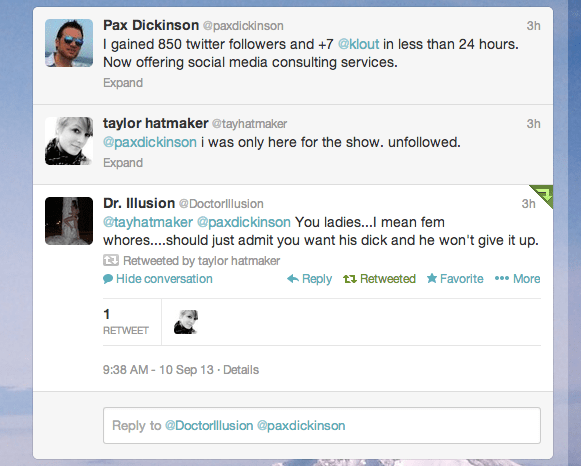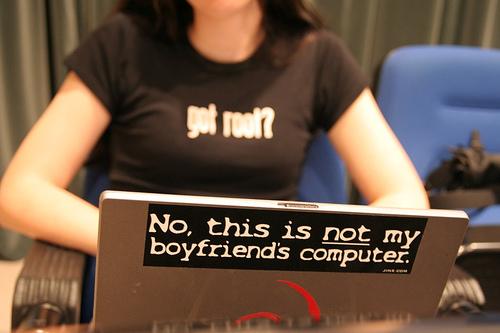
“Yes, I Know What A Gigabyte Is”: Let’s Talk About Sexism In The Tech Industry
When I lived in Paris, I taught and tutored English at a technology university. It had the same requirements as other French universities, but the only majors available were computer science related. And because of the location of many tech start-ups, all students had to maintain a certain level of English fluency. That’s where my job came in. My immediate boss went looking for exchange programs from the US, UK and other English-speaking areas of the world. From there he’d recruit as many women as he could for the position of SUSIE, a weird combination of tutor and teacher, responsible for teaching three classes a week on absolutely anything, as long as everyone spoke English the whole time. My roommate and I both did this job – it was easy, and both of us had previous teaching experience. We thought SUSIE stood for something, an acronym of some kind, but we were more interested in planning our epic spring break train trip through three countries than finding out what SUSIE actually stood for. One of my students eventually told me that it stood for nothing. It was just a “generic American girls’ name.” They didn’t call us tutors. They didn’t call us teachers. They called every single English-speaking woman in this position “Susie.” Many of my students, even my repeat ones, didn’t know my real name.
You see, most of the SUSIEs were young, fairly attractive women in their 20s – I’d estimate that about 98% of the SUSIEs were women. And this, my friends, was on purpose. Because most of the students were young college-aged men – I’d estimate about the same, 98%. In the semester I taught there, I remember having four different female students. Four. And I remember my immediate boss confessing that the selection of primarily female tutors was to entice the students to actually attend the English sessions that we taught. I also recall him saying that many of the very few male tutors were listed as female, so that his bosses didn’t ask him any questions about it. He may have been joking, I’m not sure. Either way, these things were said. And when word got around that I was gay, my attendance dropped.
I forget what I was supposed to be teaching, but one of my students told me (out of the blue, with no provocation) that homosexuality was a sin against God and that women belonged in the kitchen. I didn’t care if he was joking, or if he was just saying things to get a rise out of me. I stopped class, made everyone sit in a circle on the floor, and we had a Feminism 101 discussion (not one of the four female students was present in class that day). After talking about the basics of Feminism, I asked, “why do you think there aren’t more women enrolled here?” Most of the men didn’t really know. One said he would love to see more women enrolled here, that he was tired of hanging out with guys all the time. After all, who was he going to date? Another said that the women who were enrolled weren’t quality, and many agreed — they talked about one woman who slept with her project partners. They thought this was a tactic to make the men do more of the work while she skated through. And they all came to the conclusion that more women weren’t enrolled in this technology university because women, as a whole, weren’t interested in technology.
I asked if maybe they thought it had more to do with them discussing a woman’s sexual partners and discounting her ability when she dated anyone else enrolled at the university. Or if maybe it was because they saw the female students as simply someone to date and/or have sex with. Or perhaps there was a problem indicated by a SUSIE’s attendance directly correlating with the perceived likelihood that a student would get in her pants? I asked them to explain why I, or any of the other female SUSIEs, would be working at a technology university if we weren’t interested in technology?
I still could not convince them. At least not all of them. Perhaps one or two left that classroom thinking new thoughts about women in their tech university, but I still considered that class a failure.

via Tech Cocktail
Back in the U.S. I was working in a customer-facing IT position. One day my manager, also a woman, pulled me aside. “I have this guy here,” she said. “He stopped in because he saw women working here. And he can’t believe women work with computers and software, he couldn’t believe we hired them.” She paused. “I want you to help him. I don’t know what he wants yet.”
She introduced us – he was an older gentleman. He spent 15 minutes quizzing me. He’d point at me, his eyes narrowed. “Gigabytes,” he’d say. And I’d patiently define the term gigabytes for him. “RAM,” he’d continue. And so I defined that. Finally he was satisfied, “Oooh, you’re good!” he remarked, pleased. I asked him what he needed help with. “Oh no,” he said. “That was all.” He walked out of the store. He’d simply wanted to verify that women knew things about computers via his little verbal quiz.
I asked my manager later why she had done that. She replied that the gentleman needed a lesson not to walk into an establishment and say such dumb stuff about women in technology to women working in technology. I couldn’t argue with that, but I am still not convinced that it made any difference. Nor am I convinced that it’s every woman’s job in the tech industry to prove that she has the right to be there. What that little stunt unequivocally did was waste my time.
Both of these things happened four and five years ago. Our very own Taylor Hatmaker has an incident report that took place just last month. You might have followed the “forced resignation” (what I like to call a firing?) of Business Insider CTO Pax Dickinson as people finally caught on to the misogynist tweets he’s been firing off for years. Tweets like “Men have made the world such a safe and comfortable place that women now have the time to bitch about not being considered our equals.” Hatmaker had a brush with what I’ll dub “Feminist Critique As Invitation For Rapey Tweets”:

… I think you’re doing the internet wrong, bro.
That certainly isn’t a one-off – remember Adria Richards? At PyCon 2013, she received racist, sexist death threats on Twitter after reporting two developers for inappropriate language and sexist humor that violated the conference code of conduct. Oh, to be a woman on the internet, talking tech – happens all the time.
Which is why it cracks me up that there are people out there who are just now discovering that sexism in the tech industry exists, is a time-suck, is demoralizing, makes no sense and must be dismantled. I feel like this isn’t really a new idea, yet Elissa Shevinsky has just changed her position on the matter. The CEO of Glimpse and occasional contributor for Business Insider went from thinking that the sexism in the tech industry didn’t matter to wanting to take down the brogrammer culture.
The reason: Titstare.
Titstare was a very unfunny joke that made it on to a stage at TechCrunch’s Disrupt Hackathon. According to the New Yorker:
On Sunday, two young men from Australia took the stage to demo their new app at the TechCrunch Disrupt conference in San Francisco. They were twenty-eight-year-old Jethro Batts and twenty-four-year-old David Boulton, whose succinct biography on Twitter said, “Staring at your tits.” They were dressed casually—Boulton in a baseball cap, while Batts wore a hoodie, his hair mussed just so. They had some stubble. Their brief presentation took the form of light, cheerful banter: “We’re here to bring you Titstare!” The audience erupted in laughter, as they explained, “Titstare is an app where you take photos of yourself staring at tits.”
Their timing was well-rehearsed, and they set up another joke: “Why, Dave, why?” asked Batts.
“Well, I’ll tell you, Jethro. It’s science, my good friend. Science. Did you know that looking at breasts is directly linked to a good, healthy heart?” replied Boulton.
The comedy continued. “Dave, I think this is the ‘breast’ hack ever,” said Batts.
Boulton concluded: “It’s the breast, most titillating fun you cans have.”
Did I mention that those two developers are responsible for an Australian website that allows you to send customized, mean/abusive postcards?
And they made this presentation while on stage with the aforementioned Adria Richards?

Nor is it my girlfriend’s. via Geek With Laptop
To TechCrunch’s credit, they responded immediately (same day) with an apology, acknowledging that sexism in the tech industry is a serious problem, and outlining policy changes to ensure they don’t have another Titstare presentation:
Today’s issues resulted from a failure to properly screen our hackathons for inappropriate content ahead of time and establish clear guidelines for these submissions.
Trust us, that changed as soon as we saw what happened at our show. Every presentation is getting a thorough screening from this hackathon onward. Any type of sexism or other discriminatory and/or derogatory speech will not be allowed.
You expect more from us, and we expect more from ourselves. We are sorry.
Which brings me back to Elissa Shevinsky, who hasn’t always thought that sexism in tech was an issue, and who’s been working in and with technology since 2001. You know, originally the idea that someone could go that long in the tech industry without experiencing some crazy, mind-changing sexism seemed funny to me. As in, how-is-that-even-possible-funny, not ha-ha-funny. But as I continued to read Shevinsky’s essay and reflected on my own experiences, I realized that it’s completely possible to so expertly ignore the evidence in front of you until you’re convinced that no problem exists.
Shevinsky acknowledges that fact: “I experienced sexism all the time, but I overlooked it because I was too busy working.”
Next: What happens when we’re all too busy working?